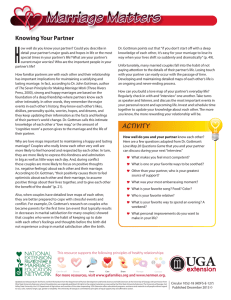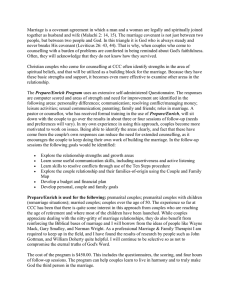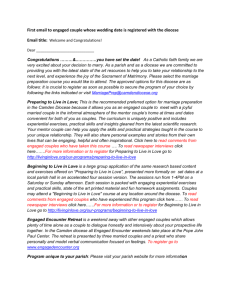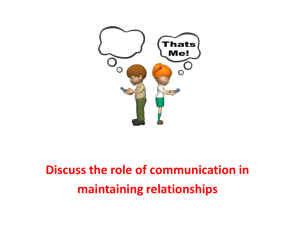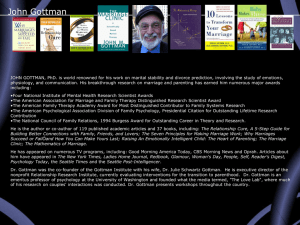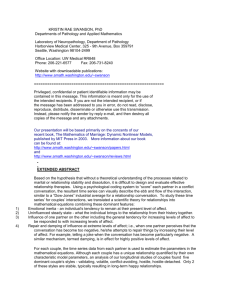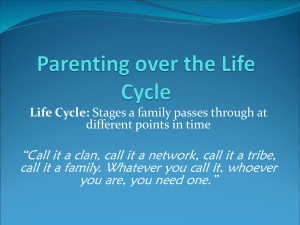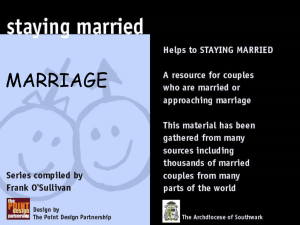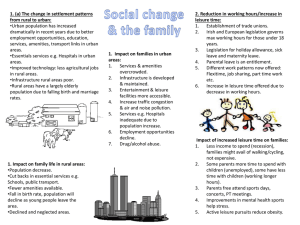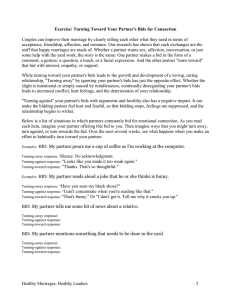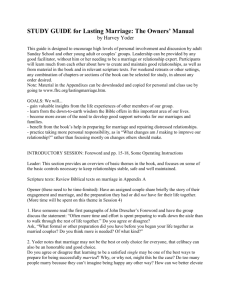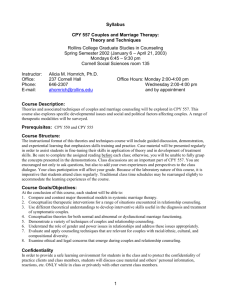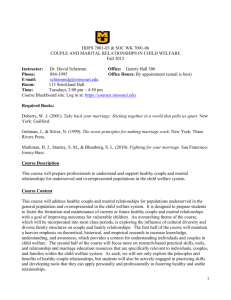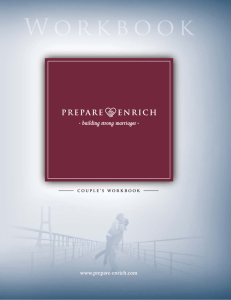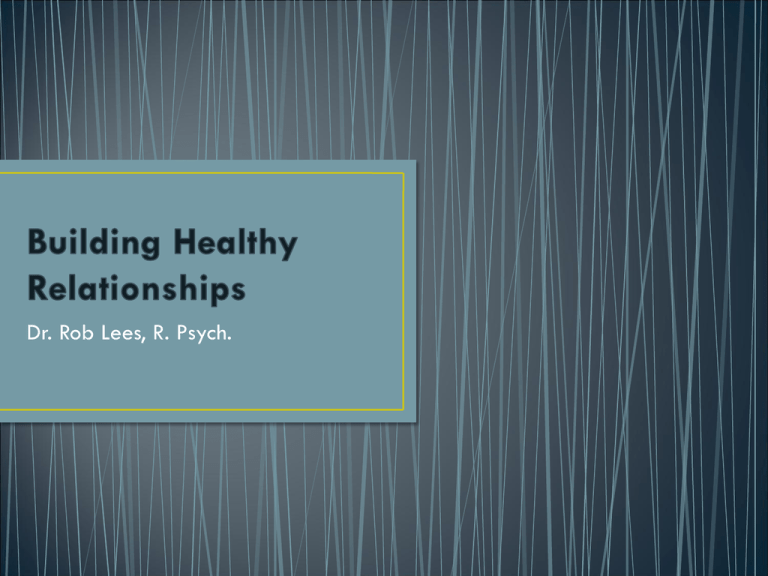
Dr. Rob Lees, R. Psych.
• Evidence that Parental Relationship quality affects Children’s
Adjustment.
• NOT blaming parents for adjustment issues
• Story of Father Calvo, a Spanish Priest and the Founder of
Marriage Encounter who worked with troubled youth.
• Difficult to improve family without improving the parental dyad.
Socio-emotional
and mental
health
challenges
Poorer
functioning for
the young
people
More stress for
the children
Greater stress
Poorer parental
relationship
quality
• Two resources based on scientific evidence with
easy to read books that explain their work.
• The Relationship House model from Dr. John Gottman of
Seattle
• The Hold Me Tight model from Dr. Susan Johnson from
Ottawa
• Close observation of couples
• Eg. Video taped conversations about
an area of conflict
• Biological indicators monitored: heart
rate, galvanic skin response, and a
sensor on the chair to capture
“wiggles”.
• Dr. Gottman claims His team can
predict with 95% assurance which
couples will divorce.
Here are a few of
the key do’s and
don’ts:
• Start conversations, especially those where you want change or
know you have conflict, “softly.”
• How conversations start often predict how they will end.
• Well, here’s what they don’t look like
• Why can’t I ever get any help around here?
• Compare that with this soft start up
• I’m feeling frustrated and need to talk about some
things, would now be ok?
Gottman describes 4
communication
patterns that announce
the coming of the end
• Defensiveness
• Criticism
• Stonewalling
• Contempt
• Men
• Get angry and
unpleasant effects
last longer than in
women
• Avoid being upset
• Obviously TOO
sensitive!!!
• Women
• Get angry and the
anger dissipates.
• Better in conflict
• Often better in any
verbal sparring or
communication
•Clear signs of relationship distress
•But, all is not lost!
• In any intimate relationship we make “bids” to
be noticed
• Can be very tentative because we fear
rejection
• Can be masked, too subtle, clumsy or made as
demands
• Bids are always saying:
• “Will you notice me?”
• “Do I matter?”
• Think about how you attempt to
get your needs met by your
partner…
• Men often use sex as a bid for
attention.
• Being physical for them is a
powerful way to feel connected
and valued as they often feel
second to their more verbally
connected spouses.
• Began her doctoral research 25 years ago at the UBC
Department of Counseling Psychology
• Spent 25 yrs collecting evidence for her Emotionally Focused
Couple Therapy
• Authored self-help book: “Hold Me Tight: Conversations for
Connection”
• Success rate for Emotionally Focused Couple Therapy = 85% of
distressed couples can become non-distressed when treated
• A blend of three well known
theories
• Gestalt therapy with its
emphasis on immediate
experience
• Family Systems theory with
its emphasis on patterns
and reciprocal causation
• Attachment theory
• According to Johnson, every
relationship is like a dance
• It has different music, but the
same pattern; different content,
but the same roles
• Some common names for a
couple’s dance:
• Protest Polka
• The Freeze and Flee Minuet
• Find the Bad Guy Salsa
• Couples can learn that their desire
to meet their needs is swept up in a
pattern that takes both of them
captive
• They can then learn to:
• Outsmart the dance
• Change their roles
• Be more aware of the needs they are
trying to meet
• Johnson might ask a couple to complete the following:
• The more I ________, the more you _________, the
more you ________, the more I __________
• The more I distance, the more you attack, the more I distance
• It doesn’t matter “where it started or who started it”, both parties
behavior fuels the dance and the pattern continues.
• Johnson assists couples in finding the
“soft,” vulnerable emotions that lay below
the surface
• A loud and demanding spouse may really
be frightened that they are unlovable and
will be abandoned if they don’t demand
to be noticed.
• The rejection sensitive spouse may pull
away out of fear that if they ask for what
the need they will be told they’re
unworthy.
• Understanding “softer”
feelings brings people
together
• Hard or angry surface
feelings drive us apart.
• What we know about
attachment in children applies in
intimate adult love relationships
• Our partner is our safe harbor
and secure base
• This makes it especially
alarming when we feel criticized
or under attack.
• Intimate relationships are meant to be safe places to go when
we are emotionally hurt
• When they aren’t safe, we need to seek other ports in the
storm
• This need is deeply woven into our biology – for example,
when you were small you had to cry to ensure the attention of
your caregivers without which you would die
Tom Hanks in Castaway
• A – are you there for me?
• R – are you responsive to me?
• E – will you engage with me?
• At a biological level we all need
to be noticed - if we aren’t
noticed as infants we will not
survive
• These needs have a powerful
“life or death” feel to them
• We can do crazy things in the
name of love!
• Women often sacrifice
themselves
• Men too often use aggression
Piglet: “Pooh?”
Pooh: “Yes, Piglet?”
Piglet: “Nothing, I just wanted
to be sure of you.”
• When our needs our not met we might:
• Protest
• Withdraw
• Cling
• Similar to attachment styles of children
• Protests
• Often come out as complaints, demands or negativity
• Partner is saying: “I want to matter to you and don’t feel I do”
• Withdrawal
• Behavior of those who don’t believe their needs will be met
• Results in a quieter relationship, but not necessarily healthier
• Clingy
• Needs predictability and assurance
• Discussed 2 scientific works focused on improving adult
relationships
• Improving parental relationships will likely benefit all those who
are in their “downline”
• Focus on the concepts of
• Beginning conversations with
Soft Start Ups
• Avoiding the 4 Horsemen of
the Apocalypse
• Being aware of “Bids”
• Focus on
• Understanding and taming negative relationship
patterns
• Paying attention to needs for connection
• Michelle Weiner Davis’ “Divorce
Busting”
• David Snarch’s “Passionate
Marriage
• Harville Hendrix’s “Getting the
Love you Want”
• BHR Chilliwack’s work with more than 500 couples we’ve learned
• Prioritizing their relationship leads to couples feeling more
empowered and able to respond to demands of parenting
• Children need to know the center of their universe is stable,
grounded, competent and nurturing
• Two parents who are connected help provide this
• What about lone parent households?
• Or “married singles” - roommates, not soul mates?
• How can your core attachment needs be met?
• If it isn’t a spouse, let it be a friend or relative
• Start with admiration and fondness
• Increase the ratio of positive to negative
interactions
• Ask yourself what’s good about your spouse?
What attracted you to them?
• Think of them in a kindly light…
• Eg. Stubborn or tenacious and determined?
• Masters of marriage, in contrast to the “disasters,” know a
lot about each other
• Favorite colours, shows, memories…etc.
• Do you really know your partner for who they are now?
• All these small things add up to a “love map”
• Helps you show that you really want to “know” your
partner
• “I” statements are self responsible
• “You” statements can come across as blaming
• “I” statements are to couple communication…
• ...what “deep breathing” is to mental health
AND
• ...what “sneezing into your sleeve” and
“washing your hands” is to public health
Situation
You Message
I Message
Wife rejected a
sexual advance
“What’s the matter
with you?”
“I feel hurt and
confused.”
Husband forgot to call
“You’re so irresponsible”
“I’m really frustrated, I
thought we had a plan.”
• Attention means making time
• Money and child care can be
stumbling blocks
• Mind set is critical: reach the
point where you can say your
own relationship is the key
relationship in the family
• Why focus on sex?
• It’s a barometer of
closeness and distance
• It is often more important
to men; men have more
difficulty connecting
• Men see sex as a way to
seek validation, to feel
that they matter and are
valued
• Solace sex
• When people get so far apart they find
comfort in each other then return to their
remote positions
• Sealed off sex
• Without emotional connection for the
release of sexual tension
• Synchronous sex
• Erotic, playful, and emotionally connected
sex
• For many, affection is the prelude to sex
• Women often want affection but they may not want sex
• Dilemma: reject the affection or feel pressured into sex when
they may not want to
• Sometimes leads to a decrease in affection
• Possible solution: a contract when you know you have time for
each other and can have sex
• Goal of webinar = having partners with kids with mental health
challenges ensure they take time to consider ways to improve
their adult attachment relationships.
• Provided some information from the work of Dr. Gottman and
Johnson, along with our insights from the Building Healthy
Relationships couple courses in Chilliwack.
• Content is not meant to be couple counselling or take the place
of a consultation with a trained marriage therapist.
• If you are aware that your relationship is in distress, consider
the services of a qualified marriage therapist as an investment
in yourself and your family.
With thanks to:
Tina Lee - Mental Health Worker, Richmond, BC
Esther Groenhof - Mental Health Clinician, Chilliwack, BC
Jay Timms - Mental Health Clinician, Surrey, BC
Bob Youssef - Counsellor, Abbotsford, BC
Technical Assistance:
Lisa Baker – Mental Health Clinician, Chilliwack, BC
•
•
•
•
•
John Gottman, Seven Principles for Making Marriage Work
Harville Hendrix, Getting the Love you Want
Susan Johnson, Hold Me Tight: Conversations for Connection
David Snarch, The Passionate Marriage
Michelle Weiner-Davis, Divorce Busting


